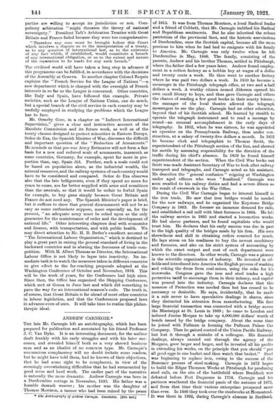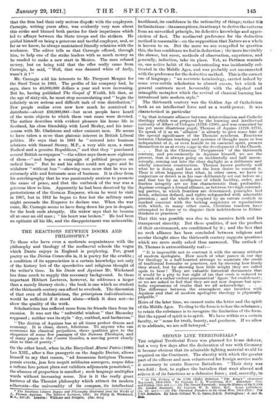ANDREW CARNEGIE.*
TICE late Mr. Carnegie left an autobiography, which has been prepared for publication and annotated by his friend Professor J. C. Van Dyke. It is an interesting document, for the author dealt frankly with his early struggles and with his later suo- ceases, and revealed himself both as a very shrewd business man and as an idealist of no common type. Mr. Carnegie's unconscious complacency will no doubt irritate some readers, but he might have told them, had he known of their objections, that he had some right to be complacent, in view of the seemingly overwhelming difficulties that he had surmounted by good sense and hard work. The earlier part of the narrative is naturally the more dramatic. Andrew Carnegie was born in a Dunfermline cottage in November, 1835. His father was a humble damask weaver ; his mother was the daughter of . Thomas Morrison, a tanner who had been ruined by the peace • TM duto8ioraphy of Andrea. Varsofie, Constable. Ras. set.] of 1815. It was from Thomas Morrison, a local Radical leader and a friend of Cobbett, that Mr. Carnegie imbibed his Radical and Republican sentiments. But he also inherited the robust patriotism of the provincial Soot, and the historic associations of Dunfermline, once the. Scottish capital, became all the more precious to him when he had had to emigrate with his family to America. Mr. Carnegie was only twelve when he left Dunfermline in May, 1848. The family, consisting of the parents, Andrew and his brother Thomas, settled in Pittsburgh, where the father died a few years later. Andrew found employ. ment in a cotton factory as a bobbin boy at wages of a dollar and twenty cents a week. Ho then went to another factory where he was paid two dollars a week. In 1850 he became a messenger in the Pittsburgh telegraph office, at two and a-half dollars a week. A worthy citizen named Alderson opened his own small library to boys, and thus gave Carnegie and others the chance of reading a few good books in their scanty leisure ; the manager of the local theatre allowed the telegraph messengers to see the play. Carnegie had no other education, beyond that of his Scottish schooL He learned by stealth to operate the telegraph instrument and to read a message by sound—an unusual accomplishment in the early days of telegraphy. In 1852, when he was sixteen, he was appointed an operator on the Pennsylvania Railway, then under con- struction, at a salary of twenty-five dollars a month. In 1853 he became clerk and telegraphist to. Thomas Scott, the superintendent of the Pittsburgh section of the line, and showed his mettle by assuming responsibility for the direction of the traffic during his chief's absence. In 1859 he found himself superintendent of the section. When the Civil War broko out Scott was made Assistant Secretary of War to look after railway transport and telegraphs, and Carnegie acted as his assistant. He describes the " general confusion " reigning at Washington under aged officers who were " fossilized." Carnegie was soon recalled to his railway duties and had a severe illness as the result of overwork in the War Office.
During the Civil War Carnegie began to interest himself in the iron trade. He saw that iron bridges would be needed for the new railways, and he organized the Keystone Bridge Company in 1863. He foresaw an immense demand for rails, and established a rail mill with blast furnaces in 1864. He left the railway service in 1865 and started a locomotive works. He had clever partners, and he found capitalists who would trust him. He declares that his early success was duo in part to the high quality of the bridges made by his firm. His own shrewdness and skill in obtaining orders counted for much. He lays stress on his readiness to buy the newest machinery and furnaces, and also on his strict system of accounting by which tho exact output and cost of each department were known to the directors. In other words, Carnegie was a pioneer in the scientific organization of industry. He invested_ in oil- fields and introduced into America the English process of washing and coking the dross from coal-mines, using the coke for his ironworks. Congress gave the iron and steel trades a high protective tariff to encourage them in their infancy, and capital was poured into the industry. Carnegie declares that this measure of Protection was needed then but has ceased to be necessary or desirable. He says, incidentally, that he made it a rule never to have speculatiVe dealings in shares, since they distracted his attention from manufacturing. His first large financial transaction was. connected with a bridge across the Mississippi at St. Louis in 1869 ; he came to London and induced Junius Morgan to take up 4,000,000 dollars' worth of bonds issued by the bridge company. About the same time he joined with Pullman in forming the Pullman Palace Car Company. Then he gained control of the Union Pacific Railway, but lost it through a mistake of a colleague. His financial dealings, always carried out through the agency of the Morgans, grew larger and larger, and he invested all his profits in extending his works, on the principle that you should " put all good eggs in one basket and then watch that basket." Steel was beginning to replace iron, owing to the success of the Bessemer process of steel-making. Carnegie in 1873 began to build the Edgar Thomson Works at Pittsburgh for producing steel rails, on the site of the battlefield where Braddock was defeated before Fort Duquesne in 1754. Carnegie and his partners weathered the financial panio of the autumn of 1873, and from that time their various enterprises prospered more than ever. In 1886 they took over the steelworks at Homestead. It was there in 1892, during Carnegie's absence in Scotland,
that the firm had their only serious dispute with the employees. Carnegie, writing years after, was evidently very sere about this strike and blamed both parties for their impatience which led to affrays between the State troops and the strikers. He prided himself on being a generous and tactful employer, and, so far as we know, he always maintained friendly relations with the workmen. The editor tells us that Carnegie offered, through him, to help one of the strike leaders with as much money as he needed to make a new start in Mexico. The man refused money, but on being told that the offer really came from Carnegie, he said; " Well, that was damned white of Andy, wasn't it 7 "
Mr. Carnegie sold his interests to Mr. Pierpont Morgan for the Steel Trust in 1901. The profits of his company had, ho says, risen to 40,000,000 dollars a year and were increasing. But he, having published The Gospel of Wealth, felt that, at the age of sixty:six, he must stop accumulating and " begin the infinitely more serious and difficult task of wise distribution." Few people realize even now how much he contrived to distribute—about £80,000,000—but most people have heard of the main objects to which these vast sums were devoted. The author describes with evident pleasure his home life in Scotland, his close friendship with Lord Morley, and his inter- course with Mr. Gladstone and other eminent men. He seems to have taken a more than platonic interest in British Liberal polities. He says that in 1881 " entered into business relations with Samuel Storey, M.P., a very able man, a stern Radical and a genuine Republican," and that they " purchased several British newspapers "—the editor says there were eighteen of them—" and began a campaign of political progress on radical lines." 'But he and his allies could not agree and he withdrew " without loss "--showing once more that he was an extremely able and fortunate man of business. It is clear from his autobiography that he was passionately anxious to promote the cause of peace, and that the outbreak of the war was a grievous blow to him. Apparently he had been deceived by the protestations of the German Emperor, whom he went to visit in 1907, but in 1912 he began to fear lest the military caste might persuade the Emperor to declare war. When the war came, Mr. Carnegie seems to have flung down his pen in despair, for the book ends abruptly. His widow says that he became all at once an old man ; " his heart was broken." He had been an optimist all his life, and the disappointment was unbearable.



































 Previous page
Previous page